- Home
- Debra Dunbar
A Slave To The Coin
A Slave To The Coin Read online
A Slave to the Coin
By Debra Dunbar
Published in conjunction with Anessa Books.
Emerson Cartwright was sweating. The white light shone down on him from above, a symbolic ray from heaven anointing him with its divine hand. A cooling breeze from the conference center’s modern ventilation system ruffled his thinning hair.
“As you can see, the divestiture of Patetrak early in the first quarter yielded an unexpected profit and provided necessary cash flow for the Meris expansion.”
It was the annual shareholders meeting, with a thousand attendees hanging on his every word. Emerson Cartwright, the rainmaker, the man with the Midas touch, the man whose eyes kept straying from his notes on the podium to the penny on the floor.
“Organic growth in the Meris line is up two percent, a notable increase in such a competitive industry.”
The penny. It looked to be face up, although it was hard to tell with the dark tarnish on its surface. Not that it mattered. Face up. Tail up. Bent and mangled. Corroded. The coin would continue to call to him, to eat away at his thoughts until he picked it up.
“Earnings per share rose this year. . .”
He had no pencil to drop on the floor. Dropping the notes would make him look like a fool. Desperate, he swept his hand to the side and the glass of water toppled off the podium. Emerson dove down, barely beating the speedy hotel staff that raced with a towel and a fresh glass of water. He snatched the penny with one hand, and the glass with another. A waiter took the glass from him as he pocketed the coin with sleight of hand a magician would envy.
“Good thing that was just water and not a martini,” he joked. “I hate to spill good gin.”
The crowd laughed obligingly.
His pocket felt heavy, as if the penny weighed far more than the tiny copper. The relief of its retrieval was short lived. Emerson began to fret about the coin’s safety. He patted his pocket, the outline of the coin under the wool and silk. What if his pocket had a hole? What if the penny slipped out as he sat down. He couldn’t lose it.
It had been this way as long as he could remember. His father and brother were the same. Even his grandmother. She’d shrugged it off as an old superstition from the great depression. That if they bypassed discarded money, no matter how small a denomination, they’d be signaling to the fates that their horn of plenty was full. The astounding financial luck of their family would end, and they’d descend into poverty. But it was more than superstition. The call of the coin, the desperate need to collect, to hold and keep safe was far beyond a superstition. It was an obsession.
An obsession not fitting for a Fortune 500 businessman.
The annual meeting was interminably long. Emerson eventually just kept his hand in his pocket, fingers wrapped reassuringly around the coin. Stupidly he’d put it in his right pocket, and every time he was forced to withdraw his hand to greet an investor he felt a stab of anxiety. He clutched it tight as he strode through the conference center lobby and out the revolving door. His limo should be here at any moment.
“Spare change?”
A chill raced through him as he turned and met the man’s eyes, alert and intelligent in a scarred face. The beggar stood on twisted legs, supported by forearm crutches in each hand. A whiff of urine and cheap whiskey floated from him on the breeze.
His eyes bore into Emerson’s. “A penny, perhaps?”
No. He couldn’t. He’d never been able to part with even the most battered of coin. His hand tightened around the penny, the dented edges digging into his palm.
“ I don’t have any money,” he lied. Where was his limo?
The smell changed slightly, becoming sharp and clean, faintly metalic. The breeze swirled leaves in a small tornado by the door. Did the beggar’s eyes glow slightly? Reddish, as if lit from behind? Or was it a trick of the late afternoon sun?
“Tis a poor man who lives under a demon’s curse; a slave to the coin.” The crippled man’s voice rang deep and strong.
Emerson saw the limo pull to the curb, and tore his gaze away from the crimson glow. He was sweating again, casting a frantic glance around the sidewalk and gutter area as he climbed into the car, just in case there was a stray coin. The clean ash trays in the corporate limo revealed no spare change. He waited until he was nearly halfway to his house before looking under the seat. Clean. He’d have to compliment the cleaning service. Sitting back against the soft, black leather, he pulled the penny from his pocket. Dark brown, Lincoln’s profile softened into the background. He flipped it over, running a thumb over the wheat strands on the tail side. Safe. Soon it would be safe.
The limo pulled up to the huge brownstone. “Can I do anything else for you, Mr. Cartwright?” the driver asked.
“No, thank you, Bruce. This is all for tonight.”
“Seven tomorrow morning?”
Emerson closed the door with a click. He’d never insisted on having the drivers open his door for him. It was too pretentious. “Thank you, that will be fine.”
The security system beeped as he put in the code and opened the door. Marble flooring showcased the gilt staircase that swept from the foyer to the upstairs. A warm golden light poured from the kitchen to the left, as did the tangy aroma of Italian pasta. His housekeeper had kindly kept a dish warm for him. But the enticement of the arabbiata was nowhere near as strong as the siren song from the room upstairs. The room that was locked down tighter than Fort Knox. Everything blurred as he climbed the stairs, his mind fixated on the penny in his pocket. The penny that yearned to be safe.
As the door opened, the faint smell of metal and dust hit Emerson’s nose. He flicked on the light. The room was neat, organized. Jar after jar of coins, boxes on the left, and far in the back, the coins of his ancestors. His father’s, his grandmother’s, and her mother before her. If there had been coins before that great grandmother, they’d been lost to history. The thought bothered him.
Crossing over the cream plush carpet, Emerson dropped the penny into a half full jar and sighed in relief. Safe. The penny was safe here with all the others. But now that his concern over the coin was alleviated, the familiar rage and frustration came. He was a man crippled by this obsession, a man forced to be alone, to hide his shame. He’d tried hypnotism, seen a therapist. The pills his doctor had prescribed hadn’t helped at all. Nothing helped. Picking up the half full jar, he threw it across the room, shattering both the jar and the old shadowbox of mounted coins that it landed on.
That didn’t help either. It just made a mess of the room, a room he’d tried to keep neat, to try and put some order and control around his uncontrollable urge. But there was no control, and order hadn’t helped. Walking over to the mess, he kicked the coins in frustration. If only he had the strength to throw them all out, to leave them behind. As he kicked the splintered frame of the shadowbox, he caught a glimpse of white, an edge of paper wedged along the frame’s edge. Bending down, he freed it and held it closer to the light. The paper was soft, worn, the folds almost split as he opened it. Flowing script greeted him, faded to lavender with age and scented with a hint of gardenia.
To My Child’s Children’s Children,
I can only hope that you can forgive me, for it would be too much to ask the Lord to do so. I tell you this not to absolve my guilt, but to explain the burden you and your children in turn must bear.
Our farm was lost, Bertram dead by his own hand. The bank had closed, wiping away all but the few coins in our pockets. My daughter and I were homeless, starving and desperate. This is no excuse for what I did. I lacked faith, could not trust in God Almighty to help us in our time of need, so I turned elsewhere.<
br />
I gave the witch everything we had and she summoned him on a moonless night. He was black and shapeless, like darkened smoke hovering in the air. His eyes burned red like coals. I commanded him to bring us wealth, to ensure that all my descendents would never want. He acquiesced with a laugh that froze my very bones, and then spoke his curse. For all eternity, my family and I would be slaves to the coin.
I have sold us all to the devil. May God have mercy on your souls.
Elizabeth Turner
His great grandmother. Dead long before he was born. This fantastic story was different from his grandmother’s one of deprivation and superstition. It couldn’t be true. It had to be the result of a psychotic break triggered by her husband’s suicide and their desperate situation. Mental illness, a pact with the devil. It didn’t matter. He wouldn’t be a slave to this insanity any longer. Leaving the broken glass and coins on the floor, Emerson went to bed.
Morning came

 Ship of the Dead: The Templar Series
Ship of the Dead: The Templar Series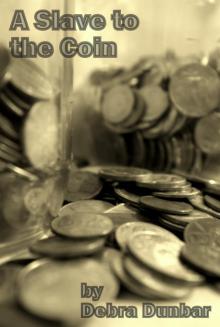 A Slave To The Coin
A Slave To The Coin Royal Blood
Royal Blood A Demon Bound
A Demon Bound Clip Joint
Clip Joint California Demon
California Demon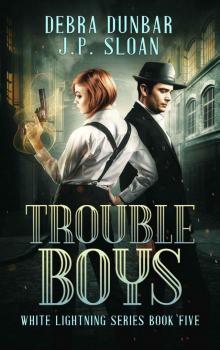 Trouble Boys (White Lightning Book 5)
Trouble Boys (White Lightning Book 5) Royal Blood: Templar Series, Book 5
Royal Blood: Templar Series, Book 5 Down the Chimney
Down the Chimney Juneau to Kenai
Juneau to Kenai Queen of the Damned
Queen of the Damned Stolen Souls
Stolen Souls Cornucopia
Cornucopia A Suburban Summoning
A Suburban Summoning Devil's Paw (Imp Book 4)
Devil's Paw (Imp Book 4) Angel of Chaos
Angel of Chaos Satan's Sword
Satan's Sword Cornucopia (Half-Breed Book 3)
Cornucopia (Half-Breed Book 3) Imp Forsaken
Imp Forsaken Northern Lights
Northern Lights City of Lust (Half-breed Book 5)
City of Lust (Half-breed Book 5) A Suburban Summoning: An Imp Series Story
A Suburban Summoning: An Imp Series Story Vampires of the Caribbean
Vampires of the Caribbean City of Lust
City of Lust No Man's Land: An Imp World Novel
No Man's Land: An Imp World Novel Three Wishes
Three Wishes Juneau to Kenai: An Imp World Novella (Northern Wolves Book 1)
Juneau to Kenai: An Imp World Novella (Northern Wolves Book 1) Wooden Nickels: White Lightning Series, Book 1
Wooden Nickels: White Lightning Series, Book 1 Last Breath
Last Breath Kingdom of Lies (Imp Series Book 7)
Kingdom of Lies (Imp Series Book 7) Unholy Pleasures (Half-breed Series Book 4)
Unholy Pleasures (Half-breed Series Book 4) Ten Lows A-Leaping: An Imp World Story
Ten Lows A-Leaping: An Imp World Story Far From Center
Far From Center Ten Lows A_Leaping
Ten Lows A_Leaping Bare Bones
Bare Bones Kingdom of Lies
Kingdom of Lies The Morning Star
The Morning Star Penance_An Imp World Novel
Penance_An Imp World Novel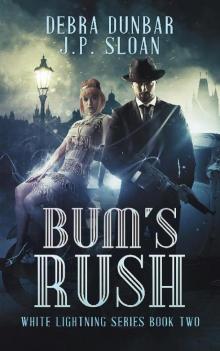 Bum’s Rush: White Lightning Series, Book 2
Bum’s Rush: White Lightning Series, Book 2 Bad Seed: An Imp World Novel (Northern Wolves Book 4)
Bad Seed: An Imp World Novel (Northern Wolves Book 4) Winter Fae
Winter Fae Winter Fae: An Imp World Novel (Northern Wolves Book 3)
Winter Fae: An Imp World Novel (Northern Wolves Book 3) Sins of the Flesh (Half-Breed Series Book 2)
Sins of the Flesh (Half-Breed Series Book 2) Devil's Paw
Devil's Paw Rogue: An Imp World Novella (Northern Wolves Book 2)
Rogue: An Imp World Novella (Northern Wolves Book 2) Satan's Sword (Imp Book 2)
Satan's Sword (Imp Book 2) Exodus (Imp Series Book 8)
Exodus (Imp Series Book 8)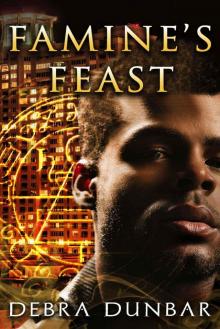 Famine's Feast (The Templar Book 4)
Famine's Feast (The Templar Book 4) Liberation
Liberation Dead Rising
Dead Rising Far From Center: An Imp World Novel
Far From Center: An Imp World Novel Imp Forsaken (Imp Book 5)
Imp Forsaken (Imp Book 5) Angel of Chaos (Imp Book 6)
Angel of Chaos (Imp Book 6)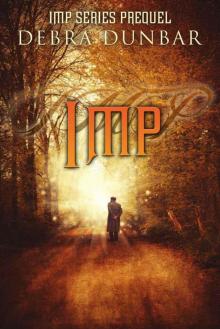 Imp
Imp A Demon Bound (Imp Book 1)
A Demon Bound (Imp Book 1) Queen of the Damned (Imp Series Book 9)
Queen of the Damned (Imp Series Book 9) Demons of Desire
Demons of Desire